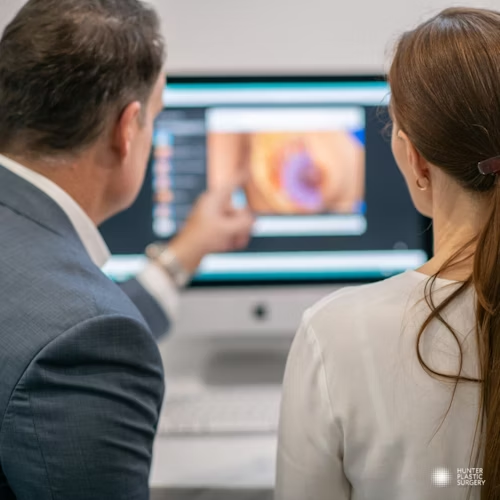Weight loss is a journey – congratulations on making it this far! If you’re reading this blog, you may have lost a significant amount of weight, perhaps after bariatric surgery, and now have an excess of loose, sagging skin that takes away from all of your hard work.
Unfortunately for most women who experience mass weight loss, excess skin not only detracts from the aesthetic appearance of the weight loss but can come with a host of functional challenges as well. Ongoing issues with skin rashes, difficulty finding clothes to ‘tuck’ the skin into and feeling uncomfortable being undressed or active are all common issues we see in weight loss champions.
One or a combination of plastic surgery ‘lifting and tightening’ procedures can compliment all your hard work and complete your weight loss journey.
Do I need private health insurance?
Yes, if you want to save thousands of dollars! For example, it reduces the cost of a tummy tuck (abdominoplasty) by almost $10,000!
We highly recommend having private health insurance in place before starting your post mass weight loss surgical journey. The cost of surgery is significantly lower for privately insured patients as the health fund covers the cost your theatre fees and hospital stay. And it comes with other benefits, such as more flexibility on the length of stay, and less cost if you need extra care or re-admission.
The most important thing to note when joining a health fund is that your policy covers you for the Medicare item numbers associated with the procedure you are wishing to undergo. For example, the tummy tuck Medicare number is 30177. Some funds will only cover this with top gold cover so you need to make sure you not only have insurance, but the right level to cover the exact procedure.
More advice on how to choose the right health fund for you can be found HERE. It is also important to remember that most health funds do have a 12-month waiting period in place after joining before you can proceed with surgery.
If your health fund does not cover you for the item number associated with your surgery, you could discuss upgrading your policy and completing the required waiting period. If you would like to proceed with surgery as a self-funded patient and pay for your own hospital fees, you can, just understanding the financial implications if there are unexpected issues. We have the total out-of-pocket costs for each procedure as an uninsured vs insured patient outlined on each procedure page.
Will Medicare cover the cost of surgery?
Even if you meet the medical criteria Medicare requires you to demonstrate, they will not meet the entire costs of surgery. Instead, Medicare will provide you with a small rebate after surgery, however the biggest benefit is that being eligible for the Medicare item number triggers your private health fund policy cover (if you have checked you have the right cover – see above).
The most common procedure that women undergo after mass weight loss is an abdominoplasty, or tummy tuck, often in combination with a breast procedure.
If you have a significant weight loss totaling 5 BMI points or more, and are having functional issues due to the excess skin, you are likely eligible for the tummy tuck Medicare item number 30177. More information about the Medicare requirements for a tummy tuck can be found HERE.
If you are experiencing neck, back, shoulder pain, discomfort or skin rashes directly in relation to large or sagging breasts, you may be eligible for Medicare item numbers 45523 (breast reduction) or 45558 (breast lift). More information about the Medicare requirements for a breast reduction can be found HERE.
While Dr Moncrieff doesn’t offer arm or thigh lifts as stand-alone procedures but will perform them as part of an overall post weight-loss journey. Generally, this means undergoing a tummy tuck and/or breast surgery first, and then staging your arm or thigh lift as a secondary procedure. The Medicare item number for an arm or thigh lift is 30171.
What weight should I be before plastic surgery?
Many women ask us when they should see us to talk about the next step in their weight loss journey. We like to meet patients for a consultation once they are at their stable goal weight and have maintained this weight for over 6 months. Why?
- The problem with seeing patients too soon on their weight loss journey is that Dr Moncrieff will work with you to form a surgical plan, but by the time you are at goal weight, that plan may not be appropriate for you. For example, a standard tummy tuck might be appropriate for you with a BMI of 27, but if you go on to lose more weight, the excess skin may require a more significant fleur de lis tummy tuck which has different benefits and risks.
- In addition, you can’t meet the Medicare criteria for a tummy tuck until your weight has been stable for 6 months.
- And finally, our quotes are only valid for 3 months, so you may need to incur the cost of another consultation to have another assessment, surgical plan and quote.
If you have undergone bariatric surgery, we recommend you must wait a full 12 months before proceeding with plastic surgery, partly to ensure their weight is stable, but also ensure they have sufficiently recovered from their initial weight loss which can impact on factors like iron levels and ability to absorb protein which you need to recover from plastic surgery!
Dr Moncrieff prefers to operate on patients with a BMI at or under 28 to minimise the risks associated with surgery, such as delayed healing and wound breakdown. He is unable to offer patients with a BMI at or above 30 surgery given these risks. More details about why weight matters when it comes to plastic surgery are featured in this article.
An easy BMI calculator is HERE.
A bit confused? We can help!
We understand this is lot to think about and understand. So I’m here, along with our team to help. Three of us have actually had weight loss surgery and a tummy tuck with Dr Moncrieff so we understand the process from your perspective, along with how Medicare and health funds work. Just gives us a call and we can help guide you on some of the process and timing issues.
Ready to begin your journey? More information about current wait times for a consultation and surgery, and how to have your process fast-tracked can be found HERE.

Blog Author:
Jessica Laing, Practice Manager, Hunter Plastic Surgery
About Jessica
Jessica joined our team in 2010 and has worked very closely with Dr Moncrieff as Patient Manager and then Practice Manager since 2015. Her commitment and care for patients is legendary. She has even won awards for her focus on service including at the 2020 Stevie Global Sales and Customer Service Awards as Young Customer Service Professional of the Year, as the Australasian Practice Manager of the Year at the 2019 MyFaceMyBody Global Awards and at the 2017 Lake Macquarie Business Excellence Awards.



